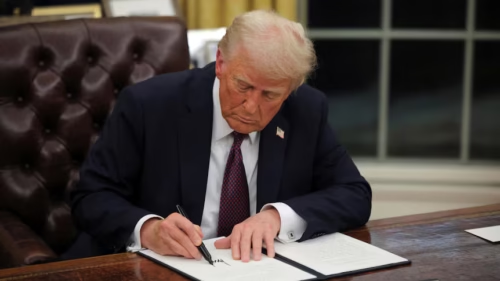
The United States has announced new tariffs aimed at strengthening domestic manufacturing while penalizing what it describes as unfair trade practices by other nations. President Donald Trump unveiled the policy during a White House briefing on Wednesday, referring to the day as “Liberation Day.” This move marks the first time African countries have been directly targeted by such measures.
Under the new directive, a 10% baseline tariff will be imposed on all imports into the U.S., with significantly higher rates applied to nations running trade surpluses with the U.S. Smaller nations, such as Lesotho, are set to face some of the steepest penalties, with tariffs reaching 50% on goods imported from the southern African country.
“Our country has been looted, pillaged, raped, plundered. Taxpayers have been ripped off for more than 50 years. But it is not going to happen anymore,” Trump stated during his announcement.
The U.S. government has released a preliminary list of countries subjected to elevated tariffs, including several in Africa. Botswana will undergo a tariff increment of 37%, South Africa will undergo a tariff increment of 30%, Tunisia will undergo a tariff increment of 28%, Côte d’Ivoire will undergo a tariff increment of 21%, Egypt will undergo a tariff increment of 10% and Morocco will undergo a tariff increment of 10%.
While Nigeria and several other African exporters were not included on the supplementary list, they will still be affected by the 10% baseline tariff, impacting trade relations with the U.S.
In 2022, Nigeria was the second-largest U.S. export destination in Sub-Saharan Africa. According to the Observatory of Economic Complexity (OEC), Nigeria exported $6.29 billion worth of goods to the U.S. in 2023 while importing $3 billion, resulting in a U.S. trade deficit of $3.29 billion.
With tariffs set to take effect on April 5 for the general 10% rate and April 9 for the increased duties on specified nations, these measures are expected to generate hundreds of billions of dollars in annual revenue for the U.S. government. The additional revenue is slated to fund key infrastructure and economic initiatives domestically.
While proponents argue that the tariffs will strengthen American industry, critics warn they could strain international trade relations, increase costs for U.S. consumers, and disrupt supply chains—particularly for African nations that rely on exports to the U.S.



